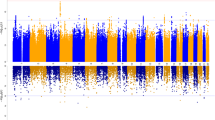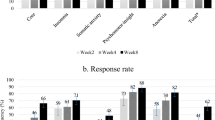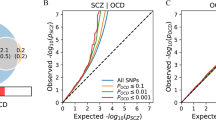Abstract
Obsessive compulsive disorder (OCD) is characterized by recurrent and intrusive thoughts that are distressing (obsessions) and/or repetitive behaviors or mental acts that the person feels driven to perform (compulsions). OCD has a partly genetic basis. For treatment of OCD, potent serotonin reuptake inhibitor (SRI) drugs (clomipramine (Anafranil), fluvoxamine (Luvox), fluoxetine (Prozac), sertraline (Zoloft), and paroxetine (Paxil)), which act on the serotonin transporter protein, are uniquely efficacious. A polymorphism in the promoter region of the gene (SLC6A4) encoding this protein,1 was recently reported to affect protein expression and to be associated with measures of anxiety and depression2 and with autism (using a family-controlled transmission disequilibrium test (TDT) design).3 SLC6A4 therefore has strong a priori support for potentially influencing risk for OCD: the protein it encodes is a medication target; a polymorphism in the gene affects function; and that polymorphism has been shown to be associated with behavioral phenotypes. We used the TDT with a set of 34 European-American family trios, 30 unrelated and four drawn from an extended pedigree, to test for linkage disequilibrium between OCD and alleles at the SLC6A4 promoter polymorphic locus. Of 35 heterozygous parents, 24 transmitted the ‘l’ SLC6A4 allele and 11 transmitted the ‘s’ allele (χ2TDT = 4.83; P<0.03). considering only the 13 sri drug nonresponders, there were 13 heterozygous parents, of whom 10 transmitted the ‘l’ allele and three the ‘s’ allele (χ2TDT = 3.77; P<0.052). these data provide preliminary support for association and linkage disequilibrium between the slc6a4 ‘l’ allele and ocd.
This is a preview of subscription content, access via your institution
Access options
Subscribe to this journal
Receive 12 print issues and online access
$259.00 per year
only $21.58 per issue
Buy this article
- Purchase on Springer Link
- Instant access to full article PDF
Prices may be subject to local taxes which are calculated during checkout
Similar content being viewed by others
Author information
Authors and Affiliations
Rights and permissions
About this article
Cite this article
McDougle, C., Epperson, C., Price, L. et al. Evidence for linkage disequilibrium between serotonin transporter protein gene (SLC6A4) and obsessive compulsive disorder. Mol Psychiatry 3, 270–273 (1998). https://doi.org/10.1038/sj.mp.4000391
Published:
Issue Date:
DOI: https://doi.org/10.1038/sj.mp.4000391
Keywords
This article is cited by
-
SLC6A4 polymorphism, population genetics, and psychiatric traits
Human Genetics (2014)
-
Association of SLC6A4 variants with obsessive-compulsive disorder in a large multicenter US family study
Molecular Psychiatry (2011)
-
The genetics of obsessive-compulsive disorder and Tourette’s syndrome: What are the common factors?
Current Psychiatry Reports (2009)
-
Pharmacogenetics of anxiolytic drugs
Journal of Neural Transmission (2009)
-
A Large Case–Control Study of Common Functional SLC6A4 and BDNF Variants in Obsessive–Compulsive Disorder
Neuropsychopharmacology (2007)



